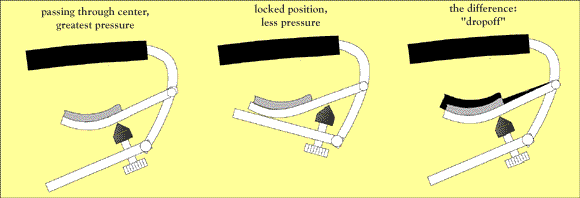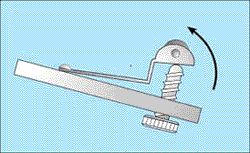Mechanical advantage of the roller design
The technical explanation
Shubb Capos work on an "over-center" locking principle. If you've used one, you know the feeling. As you close the capo onto the neck, it passes through a point of greatest resistence (the center), then relaxes somewhat into its locked position.
We've made up a name for the the difference between the amounts of pressure applied at these two points; we call it dropoff.
More dropoff means a greater difference between pressure encountered as it passes through center, and the pressure applied in the locked position. Less dropoff means a lesser difference between pressure encountered as it passes through center, and the pressure applied in the locked position.
Offhand you might imagine that the least amount of dropoff would be best, but that's not exactly the case. If you have too little dropoff, the lock is less secure and there is a risk of the capo opening accidentally. But if you have too much dropoff, too great a force is applied to the guitar neck while closing, and there could be too little pressure applied in the closed position for the truest tone.
So you see, there is a JUST RIGHT amount of dropoff that makes for perfect capoing.
Another benefit of dropoff.
It is a well known fact that if a capo is too tight, it can stretch the strings out of tune. Most players understand that there is a "just right" amount of pressure for best capoing, too. The dropoff in the closing action of the Shubb capo serves as a built-in safeguard for those players who are not clear on this concept, and who might have a tendency to over-tighten a capo. In other words, it prevents the unwise user from putting his guitar out of tune by not allowing him to bring the capo to rest in its tightest possible position.
While this feature of the Shubb capo is not especially obvious to most users, it does in fact contribute to the Shubb's excellent reputation for not causing tuning problems
____________
On the original Shubb capo, the dropoff increases at the smallest end of the capo's range, and decreases at its widest end. In other words, when used on an very thin guitar neck, the dropoff effect is exaggerated. In the extreme, it could result in insufficient pressure on the strings when engaged. On an unusually thick neck, the dropoff is minimal. In the extreme, it could result in an insecure lock, or too much pressure on the strings when engaged.


The roller mechanism equalizes the dropoff across the full range of the capo.
Because the roller head adjusts upward on an arc (as opposed to a straight line) it moves inward toward the center curve of the middle piece of the capo as it is tightened - so it does not move further past center when it is set tighter. This maintains a relationship between the moving parts that results in the same, ideal amount of dropoff at any point within the capo's working range.
So you get the ideal amount of dropoff on a thin neck, on a thick neck, and all those in between...
and on different parts of the same neck.
What's New? | STORE | Products | capo chart Artists | Company | Gallery | service
dept. | TRADE only |